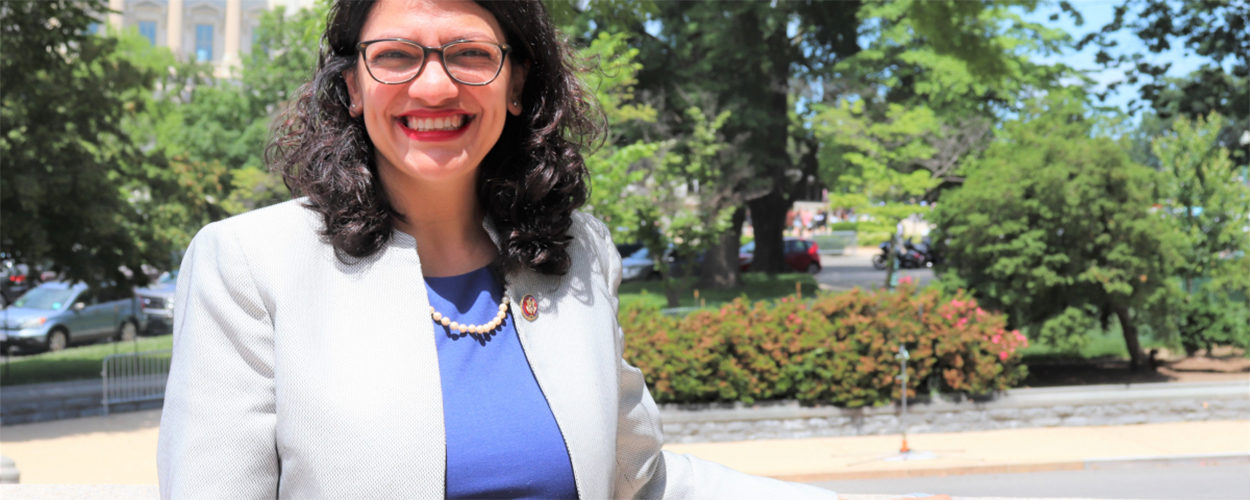This website uses cookies so that we can provide you with the best user experience possible. Cookie information is stored in your browser and performs functions such as recognising you when you return to our website and helping our team to understand which sections of the website you find most interesting and useful.
Business News Digital Legal
US Congress member discusses proposed ER right for artists on American streams
By Chris Cooke | Published on Wednesday 10 August 2022

US Congress member Rashida Tlaib has spoken to TechCrunch about a proposed legislative intervention in the way streaming services pay royalties to artists in America. Reports of that proposed intervention first started circulating last month.
Tlaib has taken an interest in the way streaming services pay artists as a result of campaigning by the American Union Of Musicians And Allied Workers, which launched in 2020 in response to complaints within the artist community that music-makers were not seeing their fair share of the monies generated by the music streaming boom.
Those complaints, of course, became much more frequent as the COVID-19 pandemic shut off other artist revenue streams, resulting in artist-led campaigns on this issue in multiple countries, not least in the UK where the #BrokenRecord and #FixStreaming initiatives led to the parliamentary inquiry into the economics of streaming.
Tlaib confirmed to TechCrunch last week that her interest in supporting a new streaming royalty right for artists stemmed from “a meeting with the Union Of Musicians And Allied Workers”.
“One of the things that continued to come up”, she added, “was what could Congress do in supporting their efforts to be protected and also for musicians to be fairly compensated for their work; to have respect in this field, especially from so many folks in the industry that continue to monopolise and so forth. They did an amazing job, came to us with this proposal and taught my team and I so much about the ins and outs of how it works right now”.
On her ongoing work with the union, she added: “We do the same thing with our housing bills, trying to address economic divide in our country. We let them lead us. I’m working for them, helping them and advocating on their behalf. They’re teaching me so much about the monopolisation in the industry, and how Spotify specifically is acting in bad faith in many ways”.
The proposals being championed by Tlaib seemingly involve the introduction of a new remuneration right for artists which would see streaming services pay music-makers directly through the collective licensing system. Such payments would likely be managed by US collecting society SoundExchange, which already handles a similar remuneration right in relation to online and satellite radio in the US, and personalised radio services like Pandora.
Introducing an artist remuneration right – or performer equitable remuneration – in relation to on-demand streaming has been discussed in multiple countries. Currently streaming services pay what is due for any recordings that are streamed to the record labels and music distributors that provided the tracks. What cut of that money artists then receive depends on the specifics of the deals they have done with the labels or distributors they are working with.
Under an ER system, artists would get some or all of their share of that money at industry standard rates via the collective licensing system, with labels and distributors usually receiving lower payments as a result. ER on streams does already exist in a small number of countries, in particular Spain and Hungary, and is currently being introduced in Belgium.
To what extent an artist would be better off under an ER system depends very much on how that system specifically works and what deals they have done in the past with labels and distributors. Some artists would be better off, but some would be worse off. There are certainly both pros and cons to the ER approach even from an artist only perspective.
Labels generally oppose the ER system. The streaming services are sometimes agnostic on this issue, providing the total amount of money they pay out for the recordings they use is more or less unchanged. However, some ER systems can increase the liabilities of streaming services.
And given that, in its campaigning, UMAW has called for a minimum rate per stream across the industry, rather than everything working on a revenue share basis, the remuneration system being proposed in the US is likely to have a big impact on the services as well as the labels.
Indeed, a minimum rate per stream would likely involve a radical overhaul of the current music streaming business model. Which means the Tlaib-backed intervention is likely to be strongly opposed by both labels and services in Washington. Asked about that by TechCrunch, Tlaib said that she believed Spotify was aware of the proposals.
“My priority is not the corporations”, she added. “It probably never will be. They have their lawyers, they have their lobbyists, they have their resources to put out ads and gaslighting people to say all the things they say will happen when we continue to push this thing forward”.





